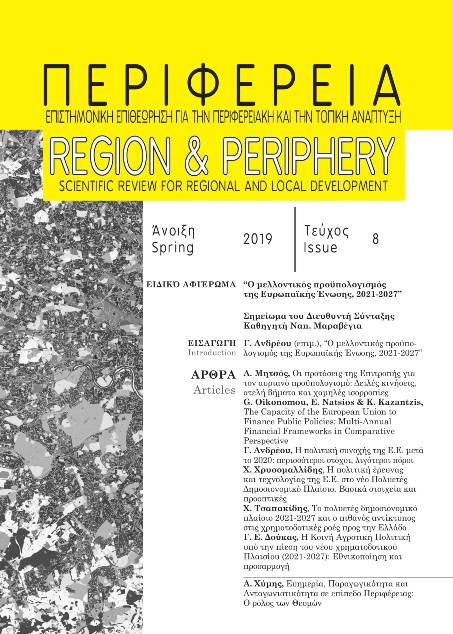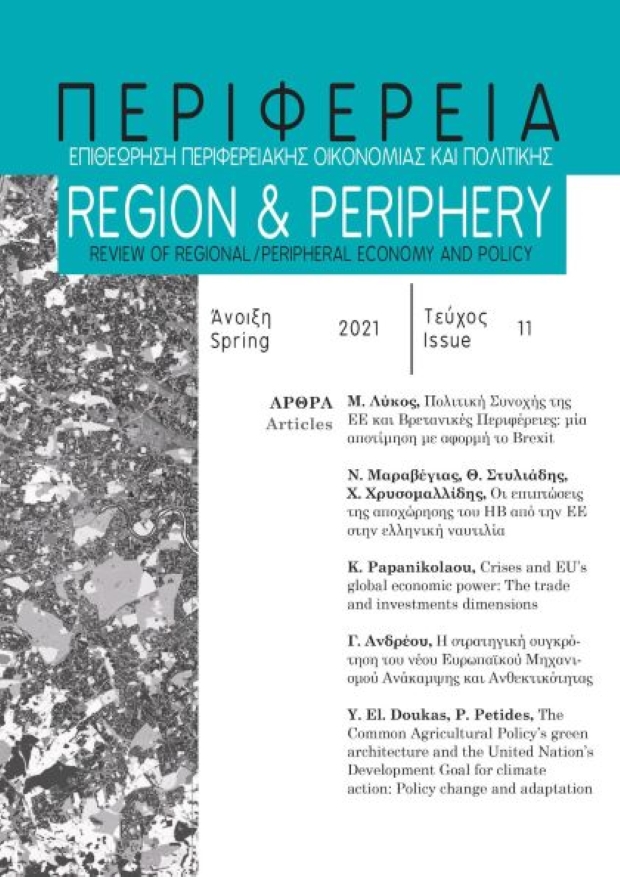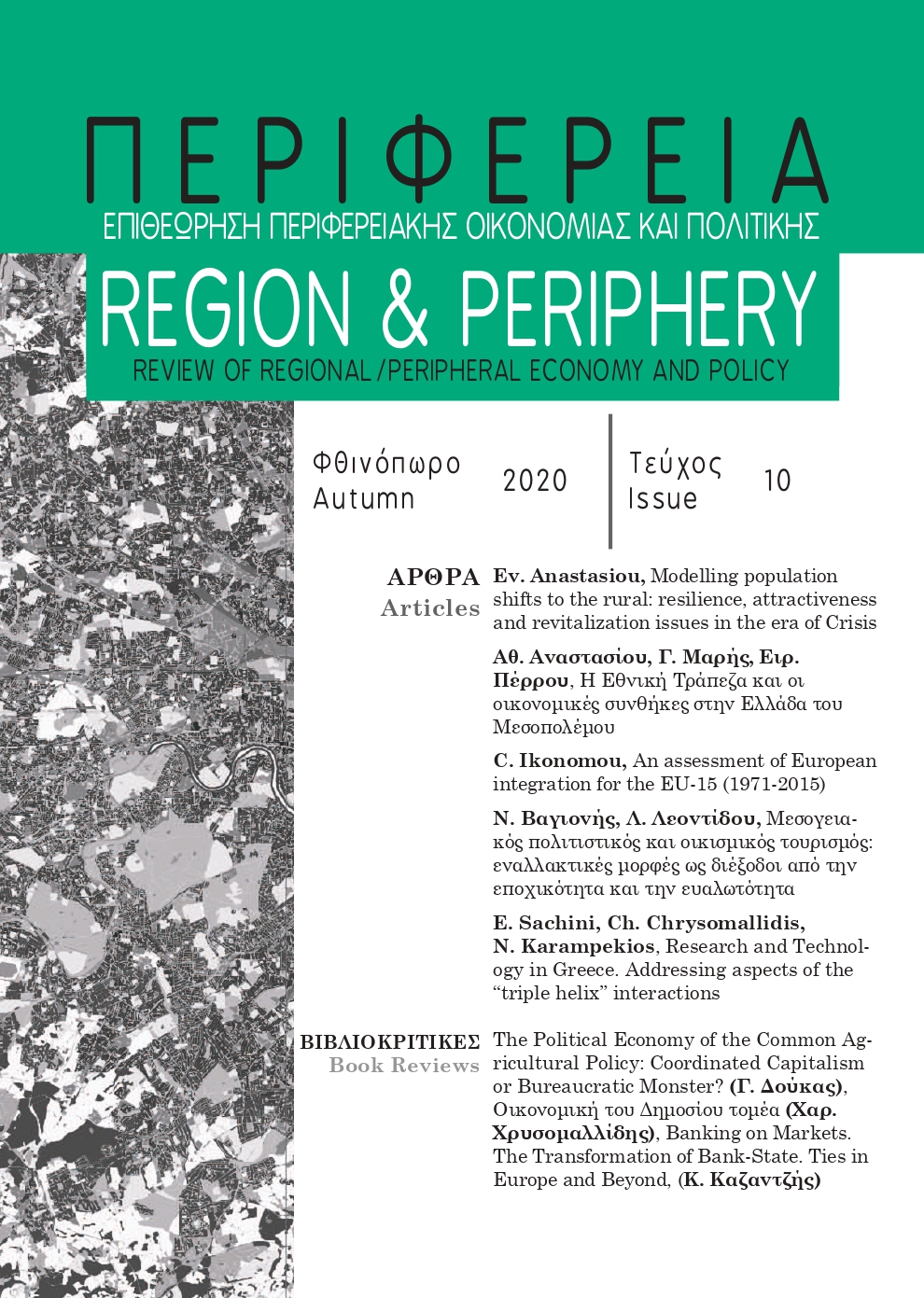Η Κοινή Αγροτική Πολιτική υπό την πίεση του νέου χρηματοδοτικού Πλαισίου (2021-2027): Εθνικοποίηση και προσαρμογή

Περίληψη
Το νέο πλαίσιο λειτουργίας του αγροτικού τομέα χαρακτηρίζεται από μειωμένες τιμές στη γεωργία –πιεζόμενες, μεταξύ άλλων, από ευρωπαϊκούς και διεθνείς μακροοικονομικούς παράγοντες καθώς και από γεωπολιτικές εντάσεις με προεξάρχουσα, αυτή του μεταναστευτικού ζητήματος. Επιπλέον, η έμφαση των εμπορικών διαπραγματεύσεων έχει μετατοπισθεί από πολυμερείς σε διμερείς συμφωνίες και η Ε.Ε., πολλές φορές πιεζόμενη από τους εμπορικούς της εταίρους, έχει γίνει πιο ανοικτή στις παγκόσμιες αγορές μειώνοντας δραστικά τους προστατευτικούς μηχανισμούς της. Παράλληλα, η Ε.Ε. έχει υπογράψει νέες διεθνείς δεσμεύσεις για την αντιμετώπιση της κλιματικής αλλαγής, και την επίτευξη της αειφόρου ανάπτυξης. Τέλος, η επικείμενη έξοδος της Μ. Βρετανίας ασκεί έντονες χρηματοδοτικές πιέσεις στον προϋπολογισμό για τη γεωργία, ο οποίος θα είναι σημαντικά μειωμένος σε σχέση με την τρέχουσα περίοδο. Στο παρόν άρθρο αναδεικνύονται οι προκλήσεις που καλείται να να διαχειριστεί η νέα Κοινή Αγροτική Πολιτική, παρουσιάζονται η προτάσεις της Επιτροπής για την περίοδο 2021-27, και επιχειρείται μία πρώτη αξιολόγησή τους με βάση τα τρέχοντα δεδομένα.
Λεπτομέρειες άρθρου
- Πώς να δημιουργήσετε Αναφορές
-
Δούκας Γ. Ε. (2019). Η Κοινή Αγροτική Πολιτική υπό την πίεση του νέου χρηματοδοτικού Πλαισίου (2021-2027): Εθνικοποίηση και προσαρμογή. Περιφέρεια | Regional Integration: Politics, Economics, Governance, (8), 133–142. https://doi.org/10.12681/rp.21159
- Ενότητα
- Ερευνητικά Άρθρα

Αυτή η εργασία είναι αδειοδοτημένη υπό το CC Αναφορά Δημιουργού – Μη Εμπορική Χρήση 4.0.
Οι συγγραφείς των άρθρων που δημοσιεύονται στο περιοδικό διατηρούν τα δικαιώματα πνευματικής ιδιοκτησίας επί των άρθρων τους, δίνοντας στο περιοδικό το δικαίωμα της πρώτης δημοσίευσης.
Άρθρα που δημοσιεύονται στο περιοδικό διατίθενται με άδεια Creative Commons 4.0 Non Commercial και σύμφωνα με την άδεια μπορούν να χρησιμοποιούνται ελεύθερα, με αναφορά στο/στη συγγραφέα και στην πρώτη δημοσίευση για μη κερδοσκοπικούς σκοπούς.
Οι συγγραφείς μπορούν να καταθέσουν το άρθρο σε ιδρυματικό ή άλλο αποθετήριο ή/και να το δημοσιεύσουν σε άλλη έκδοση, με υποχρεωτική την αναφορά πρώτης δημοσίευσης στο περιοδικό Περιφέρεια.
Οι συγγραφείς ενθαρρύνονται να καταθέσουν σε αποθετήριο ή να δημοσιεύσουν την εργασία τους στο διαδίκτυο πριν ή κατά τη διαδικασία υποβολής και αξιολόγησής της.




